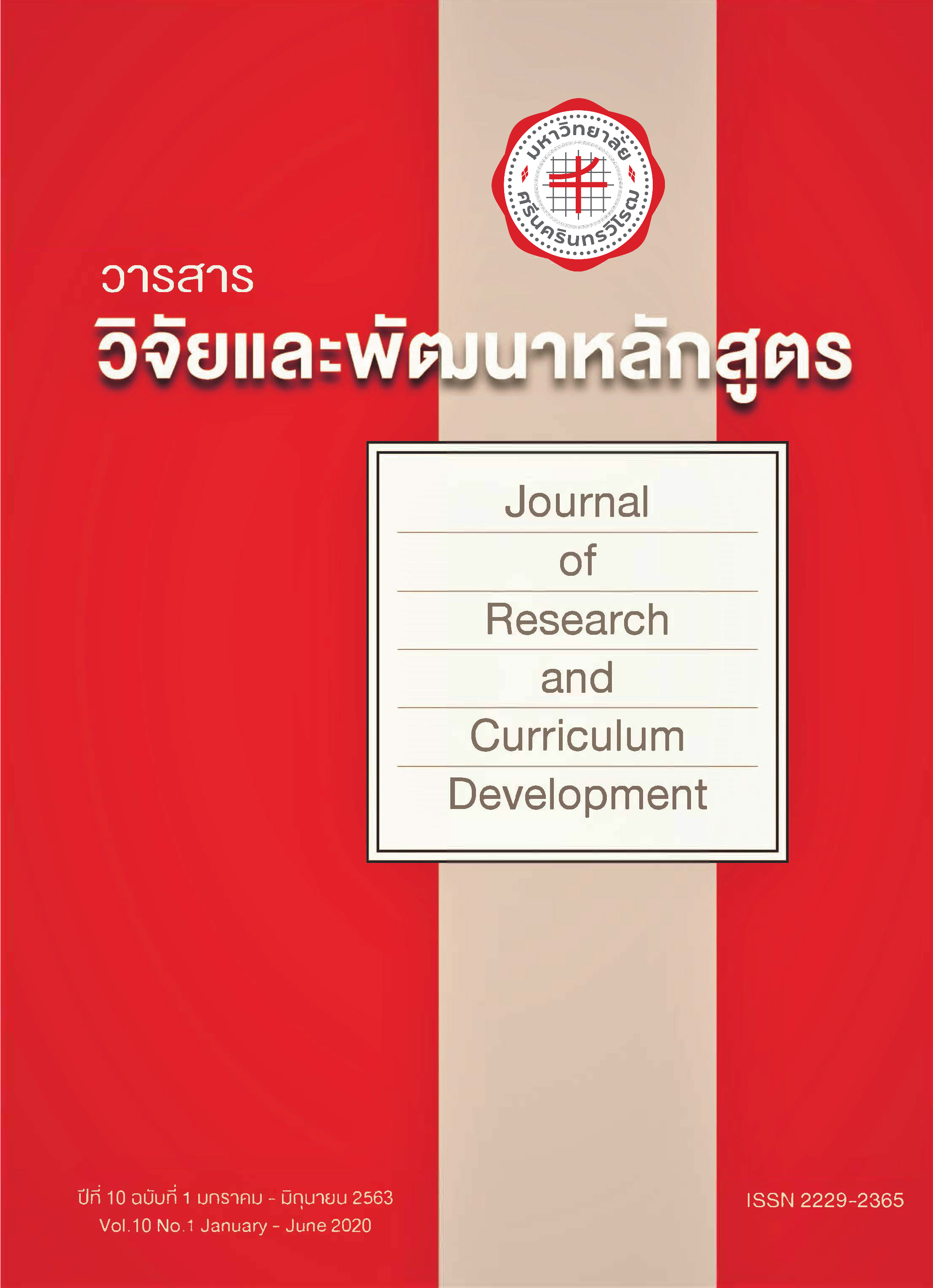กระบวนการบ่มเพาะคุณลักษณะครูไทยในทศวรรษการเปลี่ยนแปลงการเรียนรู้ สำหรับนักศึกษาครู ครุศาสตร์-ศึกษาศาสตร์
Keywords:
process of incubation, inspiration to become a teacher, teacher’s identity, teacher’s spiritAbstract
This aims of this research aimed to develop the incubation process of the characteristics of Thai teachers in the decade of transformative learning for student teachers; and to assess the quality and the effectiveness of the incubation process of the characteristics of Thai teachers. This research was divided into two stages: the first stage is a study of the characteristics of student teachers and an analysis of the gaps between characteristics of current student teachers and the characteristics of student teachers in a decade of transformative learning by interviewing a total of one hundred and fifty-five informants from four regions. Content analysis was also utilized. The second stage was a development and assessment of the quality and effectiveness of process of incubation of the characteristics of Thai teachers by a group of sixteen experts and seventy five students from first to third year in the Faculty of Education at Srinakharinwirot University were selected by multi-stage sampling to assess the effectiveness of the incubation process. The assessment form and satisfaction form were employed. The descriptive statistics and one sample t-test were used to analyze the data.
The results found the following:(1) the characteristics needed to be promoted and embedded into student teachers in terms of characteristics, affection and faith towards the teaching profession, ideology, the teacher’s spirit, emotional control and being good role models; (2) the incubation process for teachers were comprised of four courses. The first two courses were used for student teachers in their first year. The first course was “Inspiration to Become a Teacher”, the second course was “Mental development of Student Teachers” and in their second year, the third course was “Teacher’s identity”. Then, in third year, the course was “Teacher’s spirit”; (3) the process of incubation in the dimensions of correctness, appropriateness, possibility, and utilization at a high level. Moreover, after participating in the program, inspiration to become a teacher, mental characteristics, the identity and spirit of teachers were higher than the required rate of 70% and with a statistical significance level of .01.
References
งามตา วนินทานนท์. (2545). วป581 การถ่ายทอดทางสังคมกับพัฒนาการของมนุษย์. กรุงเทพมหานคร: สถาบันวิจัยพฤติกรรมศาสตร์ มหาวิทยาลัยศรีนครินทรวิโรฒ.
ชนิตา รักษ์พลเมือง และคณะ. (2557). การศึกษาสภาพและปัญหาการผลิต การใช้ และการพัฒนาครูการศึกษาขั้นพื้นฐานที่สอดคล้องกับความต้องการในอนาคต. โครงการวิจัย. กรุงเทพมหานคร: สำนักงานเลขาธิการคุรุสภา.
ธรรมนันทิกา แจ้งสว่าง. (2554). ประสบการณ์ของการเป็นครูผู้มีจิตวิญญาณความเป็นครู: การศึกษาเชิงปรากฎการณ์วิทยา [ปริญญานิพนธ์ดุษฎีบัณฑิต]. มหาวิทยาลัยศรีนครินทรวิโรฒ.
นัยนา ทองศรีเกตุ. (2544). การสอนดีมีคุณภาพ. กรุงเทพมหานคร: กรมวิชาการ.
บุญเลิศ จีรภัทร (2559). การบูรณาการหลักไตรสิกขาและอิทธิบาท 4 ในการจัดการเรียนรู้เพื่อพัฒนาคุณลักษณะที่ พึงประสงค์ของนิสิตคณะครุศาสตร์ มหาวิทยาลัยมหาจุฬาลงกรณราชวิทยาลัย. วารสารบัณฑิตศึกษาปริทรรศน์, 12(3), 215-216.
ผกาวรรณ เอกวัฒน์. (2546). การพัฒนาตนเองของครูต้นแบบ: กรณีศึกษาครูต้นแบบวิชาคณิตศาสตร์ ระดับประถมศึกษาสังกัดสำนักงานการประถมศึกษาจังหวัดลพบุรี [วิทยานิพนธ์มหาบัณฑิต]. มหาวิทยาลัยเกษตรศาสตร์.
พรเทพ เสถียรนพเก้า. (2553). การพัฒนาหลักสูตรฝึกอบรมคุณลักษณะด้านคุณธรรมจริยธรรมของนักศึกษาครู [วิทยานิพนธ์ดุษฎีบัณฑิต] . มหาวิทยาลัยเทคโนโลยีพระจอมเกล้าพระนครเหนือ.
พระครูสังฆรักษ์กิตติพงศ์ ดารักษ์. (2559). การพัฒนาทักษะชีวิตความเป็นครูด้วยหลักไตรสิกขาสำหรับนิสิตมหาวิทยาลัย มหาจุฬาลงกรณราชวิทยาลัย. วารสารบัณฑิตศึกษาปริทรรศน์, 12(1), 3-11.
วริยา ชินวรรโณ และคณะ. (2546). จริยธรรมในวิชาชีพครู. กรุงเทพมหานคร: สำนักงานกองทุนสนับสนุนการวิจัย.
วิชุดา กิจธรธรรม และคณะ. (2554). โครงการการศึกษาวิเคราะห์อดีต ปัจจุบัน และโอกาส/ความคาดหวังในอนาคตของการผลิตครูในประเทศไทย. สำนักงานคณะกรรมการวิจัยแห่งชาติ.
วิไลลักษณ์ ลังกา. (2559). อนาคตภาพของคุณลักษณะครูไทยในทศวรรษหน้า. รายงานการวิจัย. สำนักงานคณะกรรมการวิจัยแห่งชาติ (ทุนมุ่งเป้า) กรุงเทพมหานคร.
สุภัชฌาน์ ศรีเอี่ยม. (2554). การพัฒนาอัตลักษณ์นิสิตนักศึกษาในสถาบันอุดมศึกษา. วิทยานิพนธ์ดุษฎีบัณฑิต จุฬาลงกรณ์มหาวิทยาลัย.
สุมานพ ศิวารัตน์. (2560, มกราคม-เมษายน). การพัฒนาคุณภาพชีวิตด้วยไตรสิกขา. วารสารสถาบันวิชาการป้องกันประเทศ, 8(1), 46-47.
Bandura, A. (1986). Social Foundations of Thought and Action: A Social Cognitive Theory. Englewood Cliffs, NJ: Prentice-Hall.
Fishbein, M., &Ajzen, I. (1975). Belief, attitude, intention, and behavior: An introduction to
Theory and research. Reading, MA: Addison-Wesley.
Gibson, A. (2011). Spirituality in principal leadership and its influence on teachers and teaching.
Unpublished doctoral thesis, University of Waikato. Retrieved from http:// researchcommons.waikato.ac.nz/handle/10289/5176
Goh, Pauline SweeChoo; Sadd Noor Shah & Wong, KungTeck. (2012). The ‘Voices’ of Beginning Teachersin Malaysia About Their Conceptions of Competency: A PhenomenographicInvestigation.Australian Journal of Teacher Education, 37(7), 60-65.
Harun, MohbTaib &Salamuddin, Nortena. (2010). Cultivating personality development through outdoor education programme: the Malaysia experience. Procedia Social and Behavioral Sciences. 9: 231-232.
Soysouvanh, Boualinhet al. (2014). Development of Standards for Vocational Teachers at Bachelor level in LAO PDR. Faculty of Engineering – National University of Laos.





